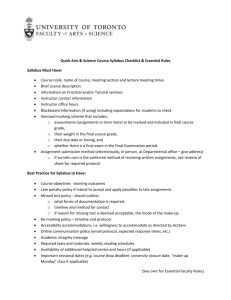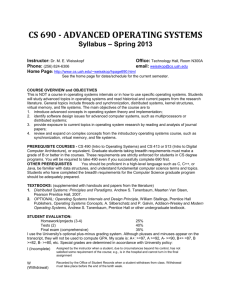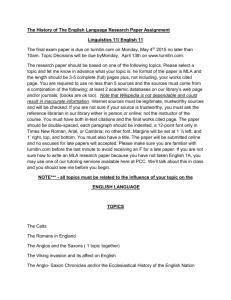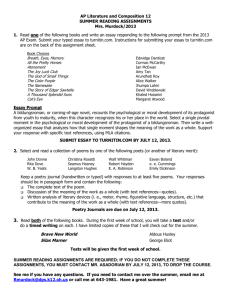AP European History
advertisement
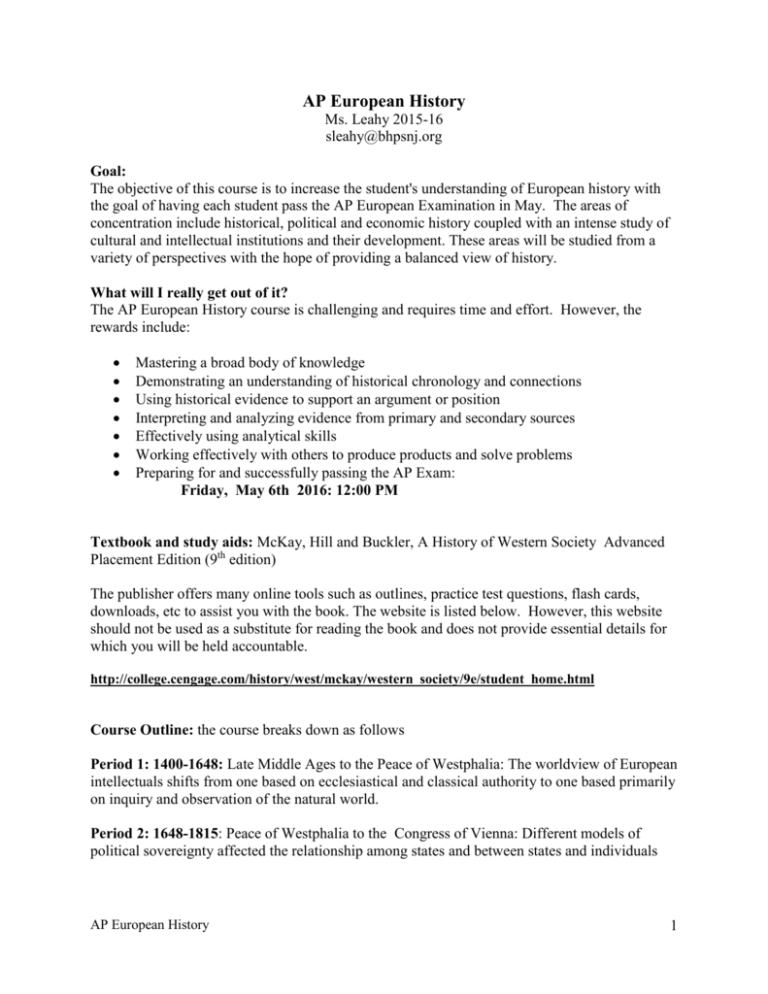
AP European History Ms. Leahy 2015-16 sleahy@bhpsnj.org Goal: The objective of this course is to increase the student's understanding of European history with the goal of having each student pass the AP European Examination in May. The areas of concentration include historical, political and economic history coupled with an intense study of cultural and intellectual institutions and their development. These areas will be studied from a variety of perspectives with the hope of providing a balanced view of history. What will I really get out of it? The AP European History course is challenging and requires time and effort. However, the rewards include: Mastering a broad body of knowledge Demonstrating an understanding of historical chronology and connections Using historical evidence to support an argument or position Interpreting and analyzing evidence from primary and secondary sources Effectively using analytical skills Working effectively with others to produce products and solve problems Preparing for and successfully passing the AP Exam: Friday, May 6th 2016: 12:00 PM Textbook and study aids: McKay, Hill and Buckler, A History of Western Society Advanced Placement Edition (9th edition) The publisher offers many online tools such as outlines, practice test questions, flash cards, downloads, etc to assist you with the book. The website is listed below. However, this website should not be used as a substitute for reading the book and does not provide essential details for which you will be held accountable. http://college.cengage.com/history/west/mckay/western_society/9e/student_home.html Course Outline: the course breaks down as follows Period 1: 1400-1648: Late Middle Ages to the Peace of Westphalia: The worldview of European intellectuals shifts from one based on ecclesiastical and classical authority to one based primarily on inquiry and observation of the natural world. Period 2: 1648-1815: Peace of Westphalia to the Congress of Vienna: Different models of political sovereignty affected the relationship among states and between states and individuals AP European History 1 Period 3: 1815-1914: Industrial Revolution to WWI: The Industrial Revolution spread from Great Britain to the continent, where the state played a greater role in promoting industry. Period 4: 1914-Present: WWI-Today: Total war and political instability in the first half of the 20th century gave way to a polarized state order during the Cold War, and eventually to efforts at transnational union. Grading: All grading will be based on a points system. Usually, tests and DBQ’s are 100 points, projects, essays, discussions, debates, blogs and participation vary from 10-50 points, quizzes are 20 points ( generally 10-15 multiple choice questions and 1-2 short answers). The questions are chapter specific but some questions may be based off primary and/or secondary sources. Tests are cumulative and consist of 20 multiple choice questions and one Long Essay Question or Short Answers. Some questions may be based off primary and/or secondary sources. However, it is expected that all discussions, debates etc will draw on cumulative knowledge. The multiple choice section on tests are worth 50 points and the scale ( AP Curve) is as follows: Number Correct 20 19 18 17 16 15 14 13 12 11 10 9 8 Points 50 48 46 44 42 40 38 36 34 32 30 28 26 Percentage 100 96 92 88 84 80 76 72 68 64 60 56 52 Reading Assignments: Diligent and focused completion of all reading assignments, as and when assigned, is the foundation for understanding and success in every Social Studies course. Students are responsible for all information in reading assignments and should be aware that not all information in the reading is covered during class time. Valuable class time is used to expand upon and deepen student understanding beyond the simple foundation provided for in the reading assignments. Perusal of on-line digital or another student’s notes is not a substitute. Reading Checks – students should be aware that all reading assignments are eligible for reading checks. Reading checks require students to demonstrate mastery of the reading assignment by demonstrating higher order thinking skills and the ability to make connections between the reading and broader topics and themes. AP European History 2 Participation: Your positive participation is expected. Students are expected to contribute in class discussions and effectively participate in class activities. Many of the class sessions will be discussion-based seminars. Participation and preparation is critical and will be included in your grade. If preparation and participation are not adequate pop quizzes and/or notebook checks will be implemented. A personal iPad problem or technology issues (wifi, etc.) are not acceptable reasons to be unprepared for class. You will be expected to participate and contribute in class. Notebooks ( paper or digital notebook): Notebooks are strongly recommended and suggested. You will be held accountable for all information (class work, readings and textbook). Participation in class discussions or assignments will often be based on the reading. Some suggestions for a digital notebook: evernote, one note or google docs. iPads: Students will be expected to bring their iPads to class, charged, on a daily basis. Not having your iPad is to be unprepared for the day. Student use of iPads in the classroom is restricted to topics and materials which, per the instructor, further the implementation of the day’s lesson. Students who are off topic with their iPads risk negatively impacting their grade for the assignment and potentially face disciplinary consequences. Google and Power School: class code: 81tygwe Using gmail and google classroom is essential in this class. Assignments, due dates, reading schedule, blogs, emails, etc will all be posted through google. Students are expected to check their email and the classroom at least once daily as this is the primary mode of disseminating information. Grades will be posted in Power School regularly. Use your login to access grades. Extra Help: I am always available for extra help- please ask. It is often best to schedule an appointment. Class expectations: Respect: Students should be respectful to all persons and property in the room. Students should be seated and ready to work when the bell rings. Appropriate measures will be taken if lateness becomes a chronic problem. In general, you need a pass to leave the room. Bathroom usage shall be limited to time which remains after the conclusion of the lesson. All school policies and procedures apply in this classroom. Please be aware of all school policies regarding electronic equipment, cell phones, hats, food, dress code, fire drills, security drills, etc. AP European History 3 Substitutes should be treated with respect. Inappropriate behavior will result in detention for individuals or the entire class. Student Absence and Lateness: Students are responsible for making up missed work. Students should be prepared to make up missed work on the day they return to school. However, missed assignments or make up work will generally not be accepted after three days. Students that miss work due to field trips should be prepared to make up work within a one-day period or prior to the field trip. Students that are late to school or class will not provided with extra time for work and students that are late to school and miss class should make be prepared to make up work that same day. Exceptions will be made for extended illness or other circumstances that arise. Students with unexcused absence will receive a zero on any missed work. Late policy: In general, assignments, projects, papers will drop one full grade for every late day. Academic Integrity: Cheating, copying, plagiarism (using someone else’s words or ideas without citation), fabrication (the invention or falsification of sources or data) , and other unauthorized use of materials is dishonest and will not be tolerated. Most universities will expel a student who is caught cheating. Violations of the above infractions will result in a zero for the assignment and will be reported to the Assistant Principal. It is expected that you are familiar and will use MLA citation style for all papers, projects, etc. If this policy needs clarification please be sure to ask for further information. In this class we will use an honor code similar to that found in many universities. Any major assignments, (not submitted through Turnitin.com) you turn in must contain the following statement handwritten and signed by you at the top of the first page before it will be accepted or graded. “On my honor I certify that this assignment is my own work and that I have neither given nor received unauthorized aid on this (test, exam, paper)” Turnitin.com The issue of academic integrity has been identified as a serious issue by both the teachers and students of Governor Livingston. As part of the school’s efforts to maintain high standards of academic integrity among the student body and avoid instances of plagiarism, the high school utilizes a plagiarism detection database called Turnitin.com. This database serves as an online resource which can be used to educate students and assist faculty members with issues related to plagiarism. Turnitin.com is primarily a sorting machine that does not evaluate ideas but rather compares a student’s work against its archived documents. The use of Turnitin.com respects the fact that student ideas remain the intellectual property of the student who generated the original ideas. There are several important functions for Turnitin.com. The primary goal for the use of this site would be to educate students as to the appropriate use of source materials. Teachers will use the site as a tool to more efficiently and effectively check for the correct citation and use of student sources. The site can be utilized to allow students to check their own work. Students will be encouraged to submit their own work through an account that will be generated by their AP European History 4 teachers. Teachers may require their students to submit the originality reports generated by Turnitin.com along with their papers. Turnitin.com: AP Euro account number 9959444 Password: euro Some tips, suggestions and comments from students: Buy an AP review book in September because it helps with themes and the essay questions. In regards to my advice for incoming students: Study hard, study often, and don’t fall behind on your readings and projects Most importantly, enjoy the class I would also advise students to make the most of time in class, ask questions, and to not be afraid to voice an unpopular opinion. Active participation in class makes Euro so much more enjoyable, and enhances the learning experience overall. I would tell an incoming euro student to not be afraid to really give it their all in anything they have to do in class. I would say to be excited because it is really one of the most fun and most rewarding classes they can take at GL. Particularly, no one should feel intimidated to share something or take risks in class because while Ms Leahy will definitely make fun of you, it will all make you a stronger student with a better sense of humor. To an incoming student: Actually read the book because your quiz questions have literally the same wording as the book. Plus it helps because not everything from each chapter is discussed in class. Finally, do not be afraid to go all out on the group projects and compete with your classmates for the best project. It was always a great time seeing which group could make the funniest video while still including a ton of information. My advice for incoming AP Euro students is that you get what you give. AP European History 5



